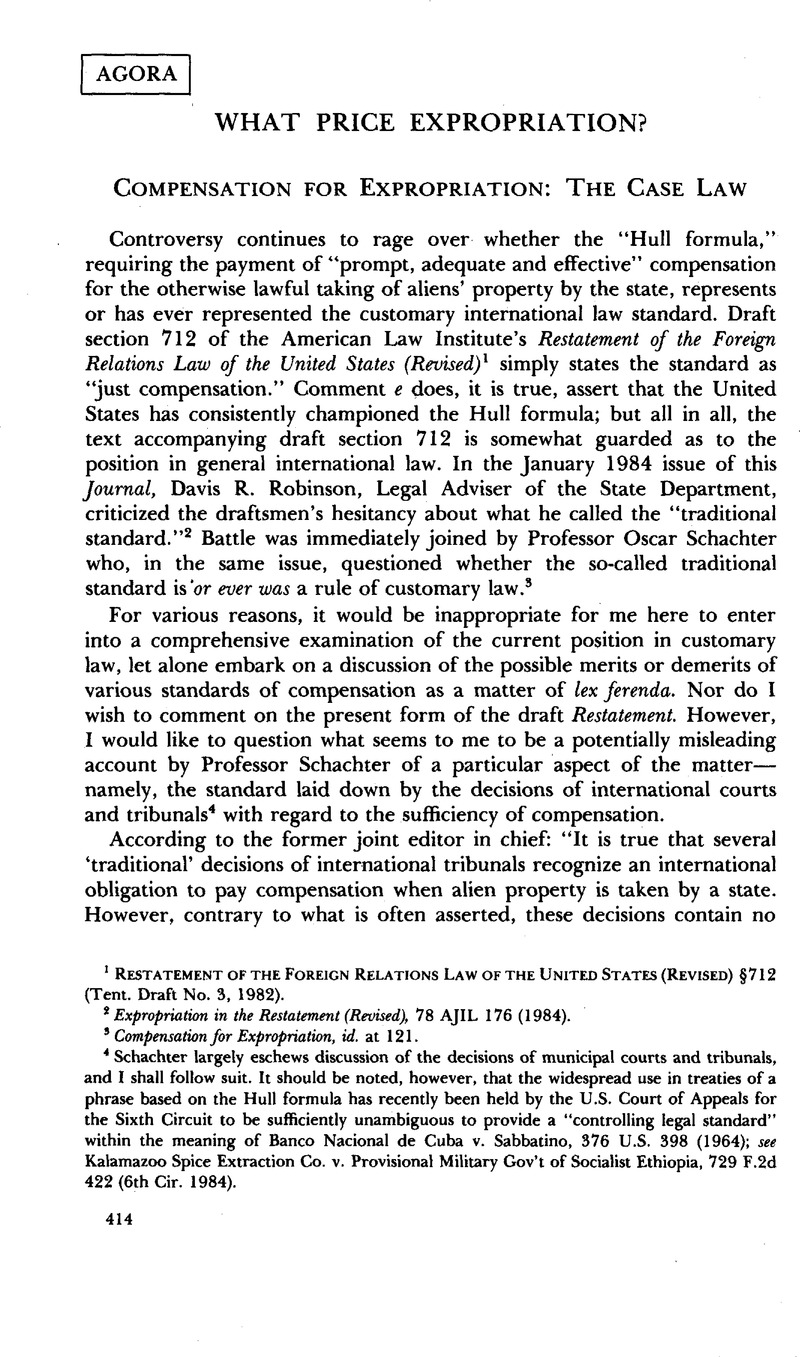Published online by Cambridge University Press: 27 February 2017

1 Restatement of the Foreign Relations Law of the United States (Revised) §712 (Tent. Draft No. 3, 1982).
2 Expropriation in the Restatement (Revised), 78 AJIL 176 (1984).
3 Compensation for Expropriation, id. at 121.
4 Schachter largely eschews discussion of the decisions of municipal courts and tribunals, and I shall follow suit. It should be noted, however, that the widespread use in treaties of a phrase based on the Hull formula has recently been held by the U.S. Court of Appeals for the Sixth Circuit to be sufficiently unambiguous to provide a “controlling legal standard” within the meaning of Banco Nacional de Cuba v. Sabbatino, 376 U.S. 398 (1964); see Kalamazoo Spice Extraction Co. v. Provisional Military Gov’t of Socialist Ethiopia, 729 F.2d 422 (6th Cir. 1984).
5 Schachter, supra note 3, at 122-23.
6 By “full” compensation, I mean the full value of the property assessed according to fair principles of valuation. For present purposes, the notion of “full” compensation and the Hull formula can be regarded as interchangeable; I shall not be dealing with the (often subsidiary) issues of the promptness and effectiveness of the compensation.
7 Case Concerning the Factory at Chorzów (Merits), 1928 PCIJ, ser. A, No. 17.
8 Schachter, supra note 3, at 123.
9 1928 PCIJ, ser. A, No. 17, at 47.
10 Id. at 46.
11 Including the instructions given for an expert inquiry by the Order issued simultaneously with the Judgment (id. at 99)—an Order whose significance in matters of valuation appears to have been largely overlooked by commentators.
12 (Nor. v. U.S.), 1 R. Int’l Arb. Awards 307 (1922).
13 Id. at 332 and 339.
14 See, e.g., Monongahela Navigation Co. v. United States, 148 U.S. 312 (1893); and, for a recent example, Kirby Forest Indus, v. United States, 104 S.Ct. 2187 (1984).
15 1 R. Int’l Arb. Awards at 339-42.
16 It should also be noted that the Norwegian Shipowners’ Claims award was cited in oral argument in the Chorzow Factory case. 1928 PCIJ, ser. C, No. 15-11, at 161, 180.
17 Ralston, J. H., The Law and Procedure of International Tribunals (rev. ed. 1926, supp. 1936)Google Scholar.
18 Schachter, supra note 3, at 123.
19 Including two in Ralston itself: the De Sabla and Spanish Zones of Morocco cases (discussed below).
20 Pace Schachter, supra note 3, at 123.
21 In fairness, it should be pointed out that the compromis d’arbitrage in a particular case may have given the tribunal either a narrower or a wider discretion than that accorded by general international law (for instance, the compromis in the Norwegian Shipowners’ Claims required the tribunal to decide the claims “in accordance with the principles of law and equity,” 1 R. Int’l Arb. Awards at 310); but since those who are going to have to apply the law today are less likely to be the International Court of Justice than other arbitrators bound by similar terms of reference, or the parties themselves, this caveat should be seen in its proper perspective.
22 I have not included in this survey cases where, rightly or wrongly, there was a holding that the taking was unlawful under general or particular international law (e.g., the premature termination of a concession in the Lighthouses Arbitration, Claim No. 27, 23 ILR 299 (1956)); but it should be noted that in several of these cases it seems to have been assumed without discussion that full compensation was required even for lawful takings. See, e.g., Upton Case (U.S. v. Venez.), 9 R. Int’l Arb. Awards 234 (1903), a case where damages were awarded for the temporary taking of, and damage to, property.
23 7 R. Int’l Arb. Awards 64, 65 (1923).
24 Id. at 66.
25 (Germ. v. Roumania), 2 id. at 901, 909 (1928).
26 W. at 615, 647(1925).
27 E.g., in Claim No. 6, id. at 666.
28 28 AJIL 602, 611-12 (1934).
29 Note also the separate opinion of Judge Gros in the Case Concerning the Barcelona Traction, Light & Power Co., Ltd. (New Application) (Belg. v. Spain), 1970 ICJ Rep. 3, 267, 276 (Judgment of Feb. 5), holding that, even in the case of a lawful taking, shareholders are entitled to “compensation for their investment and what it represented on the date of the damage.”
30 Libyan American Oil Co. v. Government of the Libyan Arab Republic, Apr. 12, 1977, 62 ILR 140 (1982), 20 ILM 1 (1981).
31 In the other two, BP Exploration Co. (Libya) Ltd. v. Government of the Libyan Arab Republic, Oct. 10, 1973, 53 ILR 297 (1979), and Texaco Overseas Petroleum Co. and California Asiatic Oil Co. v. Government of the Libyan Arab Republic, Jan. 19, 1977, id. at 389, 17 ILM 3 (1978), the remedies awarded were, respectively, damages and restitutio in integrum; accordingly, they will not be discussed here. They are, however, even more “conservative” in their general approach than the LIAMCO award.
32 62 ILR at 209-10.
33 Id. at 211-14.
34 Arbitration between Kuwait and American Independent Oil Co., Mar. 24, 1982, 21 ILM 976 (1982).
35 23 ILM 1 (1984). The Iranian arbitrator, Parviz Ansari Moin, refused to sign the award.
36 Id. at 7.
37 Id. at 9 and 11, respectively.
In the course of his concurring opinion, Richard M. Mosk rejected the suggestion that, in customary law, “less than full compensation can constitute appropriate compensation” (id. at 14, 19). See, to similar effect, the opinion of George H. Aldrich, concurring in Chamber Two’s award on agreed terms in ITT Industries, Inc. v. Islamic Republic of Iran, 2 Iran-U.S. Claims Tribunal Rep. 349 (1983-I); but see also Dr. Shafeiei’s note in reply to this opinion (id. at 356, 358).